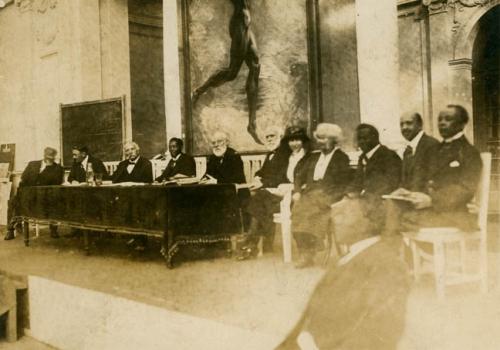Pan-Africanism and Independence Movements: Explore the ideologies of Pan-Africanism and the influential leaders who spearheaded independence movements across the continent, such as Kwame Nkrumah, Julius Nyerere, and Patrice Lumumba.
Pan-Africanism and Independence Movements: A Quest for Unity and Freedom
The ideologies of Pan-Africanism and the independence movements that swept across Africa during the 20th century were pivotal in shaping the continent's history and collective identity. Led by influential figures such as Kwame Nkrumah, Julius Nyerere, and Patrice Lumumba, these movements sought to challenge colonial oppression, unite African nations, and assert the right to self-determination. In this article, we delve into the ideals of Pan-Africanism and explore the lives and legacies of these visionary leaders who played a crucial role in the struggle for independence.
Pan-Africanism: A Vision of Unity and Liberation
Pan-Africanism emerged as a movement advocating for the unity and solidarity of African peoples across the globe. It aimed to challenge the dehumanizing effects of colonization, foster a sense of shared identity, and advocate for the liberation and self-determination of African nations.
One of the early proponents of Pan-Africanism was Marcus Garvey, a Jamaican-born activist who championed the notion of African redemption and the importance of African self-reliance. Garvey's Universal Negro Improvement Association (UNIA) inspired a generation of African intellectuals, laying the foundation for the Pan-Africanist movement.
Kwame Nkrumah: Architect of Ghana's Independence
Kwame Nkrumah, a towering figure in African history, led Ghana to become the first sub-Saharan African nation to gain independence from colonial rule in 1957. Nkrumah was deeply committed to Pan-Africanism and believed in the power of unity to overcome colonial oppression.
As the leader of the Convention People's Party, Nkrumah mobilized the masses and advocated for Ghana's self-determination. He called for an end to colonial rule not only in Ghana but also across the entire African continent. Nkrumah's vision extended beyond Ghana's independence, envisioning a united Africa that could harness its resources and talents for the collective benefit of its people.
Nkrumah played a pivotal role in the formation of the Organization of African Unity (OAU), now known as the African Union (AU), which sought to promote African unity and cooperation. His influential book, "Africa Must Unite," outlined his Pan-Africanist vision and called for the creation of a United States of Africa.
Julius Nyerere: A Visionary of African Socialism
Julius Nyerere, the founding father of Tanzania, was a prominent leader in the Pan-Africanist and independence movements. He advocated for a unique ideology known as Ujamaa, which blended elements of socialism, African communal values, and self-reliance.
Nyerere's vision went beyond political independence; he sought to build a just and equitable society, free from exploitation and oppression. Through his policies, he emphasized rural development, education, and collective farming, with the goal of eradicating poverty and creating a sense of shared responsibility among Tanzanians.
Nyerere played an instrumental role in supporting liberation movements across Africa, providing refuge, training, and logistical support to freedom fighters. He firmly believed in the interconnectedness of African struggles and the necessity of African nations supporting one another in their fight against colonialism.
Patrice Lumumba: A Tragic Symbol of African Independence
Patrice Lumumba, the first democratically elected Prime Minister of the Democratic Republic of Congo, symbolized the aspirations and challenges faced by African nations during the struggle for independence. Lumumba's vision of a united and prosperous Congo was cut short by external interference and internal divisions.
Lumumba's brief tenure as Prime Minister was marked by relentless opposition from both foreign powers and internal factions. His impassioned speeches and fierce commitment to national sovereignty threatened the interests of Western powers and multinational corporations, leading to his eventual overthrow and assassination in 1961.
Despite his untimely demise, Lumumba's legacy as a champion of African independence endures. He embodied the spirit of Pan-Africanism and the fight against neo-colonialism, and his tragic fate remains a reminder of the challenges faced by African leaders who dared to challenge the status quo.
The Legacy of Pan-Africanism and Independence Movements
The ideals of Pan-Africanism and the struggles for independence continue to shape Africa's identity and aspirations. While the achievement of political independence was a significant milestone, the fight for economic self-determination, social justice, and the realization of the Pan-Africanist dream remains ongoing.
The legacy of Nkrumah, Nyerere, Lumumba, and other visionary leaders lies not only in their individual achievements but also in their collective impact on the continent. Their ideas and actions inspired future generations of African leaders, intellectuals, and activists to carry the torch of Pan-Africanism, social justice, and African unity.
The AU, established with the aim of promoting African integration, economic development, and political stability, stands as a testament to the enduring influence of Pan-Africanism. Efforts such as Agenda 2063, a blueprint for Africa's development, reflect the continuing pursuit of the ideals set forth by Nkrumah, Nyerere, and Lumumba.
Pan-Africanism and the independence movements that swept across Africa in the 20th century were transformative forces in the struggle against colonial oppression and the quest for self-determination. Visionary leaders such as Nkrumah, Nyerere, and Lumumba played instrumental roles in advancing these causes, advocating for unity, liberation, and the empowerment of African nations.
Their legacies remind us of the enduring importance of Pan-Africanism in promoting solidarity, cultural identity, and the pursuit of a better future for all Africans. By embracing the values and aspirations of these visionary leaders, Africa can continue to strive for economic empowerment, social justice, and a united continent that harnesses its vast potential for the benefit of its people and the world at large.

Comments
Post a Comment